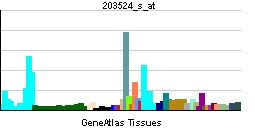Species Human Entrez 4357 | Human Mouse Ensembl ENSG00000128309 | |
 | ||
Aliases MPST, MST, TST2, TUM1, mercaptopyruvate sulfurtransferase External IDs MGI: 2179733 HomoloGene: 31942 GeneCards: MPST | ||
3-mercaptopyruvate sulfurtransferase is an enzyme that in humans is encoded by the MPST gene.
Contents
Function
This gene encodes a protein which can function as a monomer or as a disulfide-linked homodimer and which catalyzes the transfer of a sulfur ion from 3-mercaptopyruvate to cyanide or other thiol compounds. It may be involved in cyanide degradation and in thiosulfate biosynthesis. The encoded cytoplasmic protein is a member of the rhodanese family but is not rhodanese itself, which is a mitochondrial protein. Alternatively spliced transcript variants encoding the same protein have been identified. Deficiency in MPST has been found related to mercaptolactate-cysteine disulfiduria.
Gene
The MPST gene lies on the chromosome location of 22q12.3 and consists of 6 exons.
Protein
MPST consists of 317 amino acid residues and weighs 35250Da. MPST contains two rhodanese domains with different primary structures but similarity in secondary structure suggests a common evolutionary origin. The catalytic cysteine residue only exists in the C-terminal rhodanese domain.
Function
MPST is expressed in a number of tissues, including kidney, liver, lung,heart, muscle, spleen and brain. H2S is produced from l-cysteine by cystathionine-γ-lyase (CSE) and MPST. l-cysteine-dependent production of H2S by MPST is a two-step reaction. In the first step, cysteine aminotransferase converts l-cysteine along with α-ketoglutarate into 3-mercaptopyruvate (3-MP). Subsequently, MPST converts 3-MP into H2S. MPST catalyzes the transfer of a sulfur atom from mercaptopyruvate to sulfur acceptors like cyanides or thiol compounds. Thus it is also considered to participate in cysteine degradation. MPST generates H2S in coronary artery, mediating its effects through direct modulation of NO, namely vasodilation. This has important implications for H2S-based therapy in healthy and diseased coronary arteries.
Clinical significance
MPST deficiency is observed in individuals with mercaptolactate-cysteine disulfiduria, which is a rare inheritable disorder associated with oversecretion of mercaptolactate-cysteine disulfide in urine. Immunoreactivity for MPST was detected in malignant uroepithelium and muscular layer of bladder cancer samples. Protein levels and catalytic activities of MPST increased with the increase of malignant degrees in human bladder tissues and human urothelial cell carcinoma of bladder (UCB) cell lines and this may promote the application of MPST novel enzymes to UCB diagnosis or treatment.
Interactions
MPST has been found to interact with:
